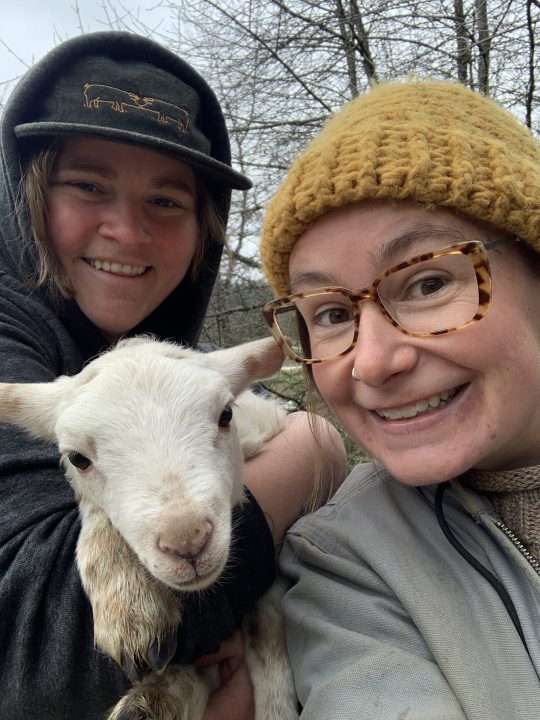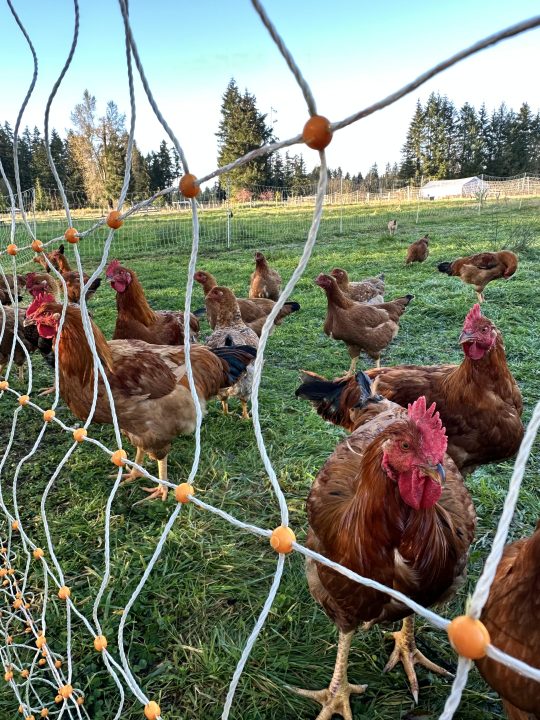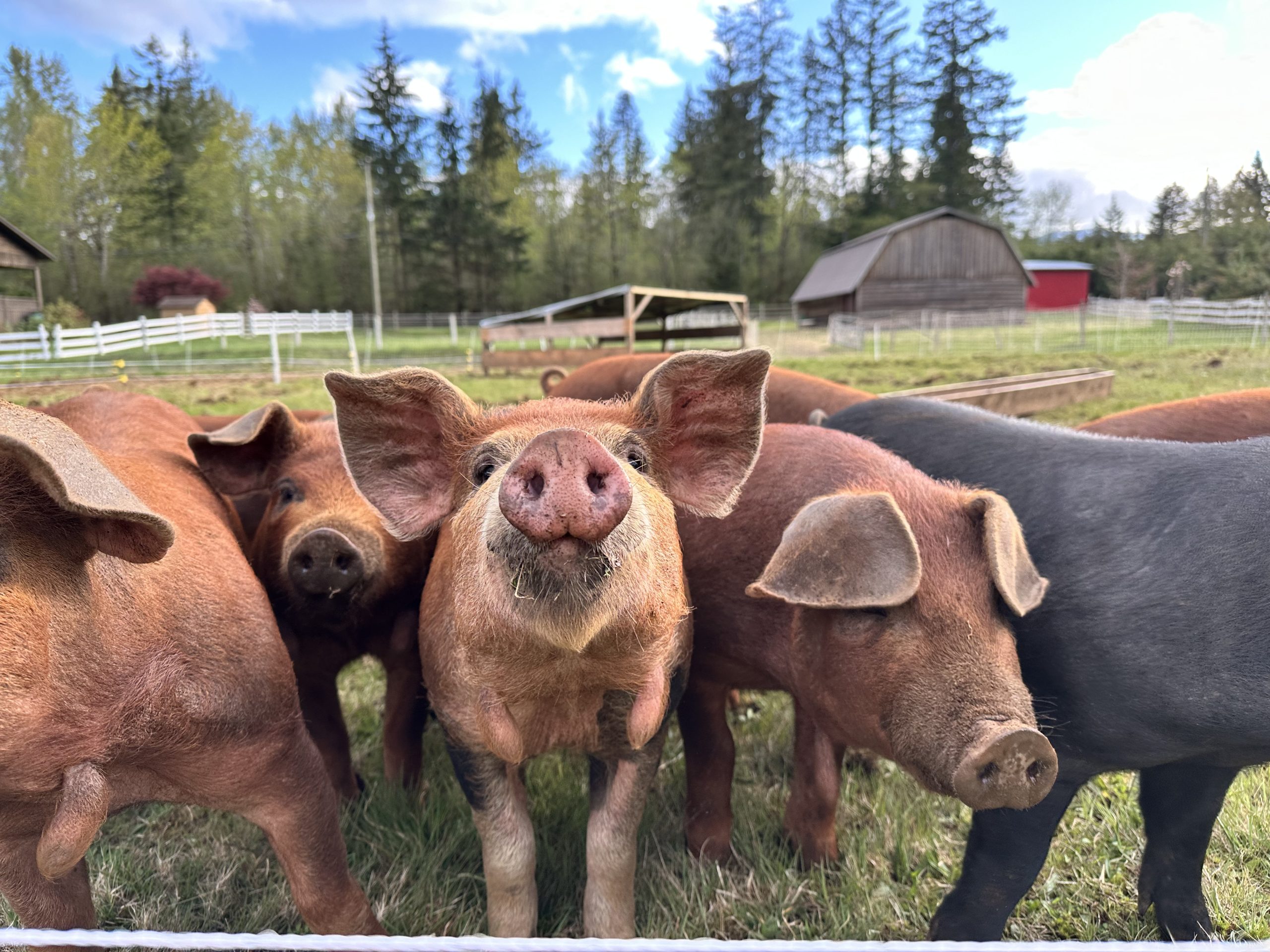“The way that we farm and the reason we do it is a direct response to the current climate crisis. For us, it is extremely important to consider how our practices impact the environment and for our time stewarding this land to improve the environment for current and future generations. As farmers, we are a part of an ecosystem, and it is our duty to work in reciprocity with the land and to work with the ebbs and flows of nature. ”
– Christine and Emmo, Matriarch Meats – Courtenay, BC
Young Agrarians is celebrating the eleventh year of the Business Mentorship Network (BMN) program in BC and the third year of the BMN in the Prairies! The BMN offers a year-long farm business mentorship to a diverse array of new and young farmers. Through one-on-one mentorship, peer networks, and online workshops, new farmers develop the skills necessary to operate ecologically sustainable and financially viable farm businesses.
Applications for Mentees across Western Canada open in October 2025. Mentor applications are accepted year-round. Want to be notified when applications open for the 2026 cohort? Click below!
Meet a mentee from the current cohort and learn about their farm and why they joined the Business Mentorship Network. Want more? Head over to our BMN Blog for more mentorship stories.
Meet a Mentee: Matriarch Meats
We are Christine (she/her) and Emmo (she/her) of Matriarch Meats. We are delighted to be mentored by Tristan and Aubyn of Spray Creek Ranch. Our farm is located on the Unceded Traditional Territory of the K’ómoks First Nation, the traditional keepers of this land.
What inspired you to get into farming? How did you learn how to farm?
We both found farming in our early 20’s through a desire to have a positive impact on our world and communities. Our love of good food and plants guided us to small-scale farming.
Christine began farming as an apprentice on a market garden on Salt Spring Island. She spent the next 9 years working on and managing various vegetable farms across the province. When we started Matriarch Meats, it was very nearly like starting from scratch for her. Though, there are some common themes in veggie and livestock farming like: observation, discernment, and hard flippin work. Luckily, Emmo had much more livestock experience. Emmo got her start farming during a trip to Ireland where she WOOFed on an amazing farm. She then attended the Tsawwassen First Nation Farm School where she raised veggies and livestock. She gained more skills working as a butcher and working up at Spray Creek Ranch.

What type of business structure is your farm?
When we began our own business in 2022, we decided to incorporate to reduce our individual liability.
How much land is under production on your farm and what do you produce? What kind of land agreement do you have? Are there special relationships that enabled this?
As of March 2024, we steward a 20 acre farm, about 18 of which are in pasture. We raise and rotate sheep, pigs, chickens, and turkeys. Our layers of privilege enabled us to end up on this land. We lease the entire farm and its dwellings from Emmo’s uncle, who purchased the property in 2024 with the intention of leasing it to us to farm.
Did you access any financing to buy land or start your farm business?
We started Matriarch Meats on land that we leased (paid in meat) on Salt Spring Island. This farm also employed Christine as a full-time veggie farm manager with a decent salary (relative to small-scale farming wages) and provided housing in addition to her salary. Not having to pay rent allowed us to invest our savings and off-farm income into the start-up of our business. This helped us build a good foundation for our business. We also received a $13,000 grant in our second year to purchase moveable rotational grazing infrastructure.
We are pretty debt adverse, so our business plan includes one of us having full-time off-farm work to support our living costs and help with cash flow. However, as we think about how we want to grow and see the demand for our product, we feel more prepared to approach a credit union for a loan.
What types of ecological farm practices and/or responses to climate change realities do you engage in?
The way that we farm and the reason we do it is a direct response to the current climate crisis. For us, it is extremely important to consider how our practices impact the environment and for our time stewarding this land to improve the environment for current and future generations. As farmers, we are a part of an ecosystem, and it is our duty to work in reciprocity with the land and to work with the ebbs and flows of nature. We do this mainly through rotational grazing, which has huge benefits to soil and animal health. We move our flocks daily in the height of the season. This gives the land time to rest; for grass to grow and for all the magic to happen below. Soil health is paramount to a resilient and regenerative ecosystem. Healthy soils can allow for greater water retention in years of droughts and also increase absorption and lower runoff in the years when the rain hits harder. It also doesn’t hurt that healthy soils sequester carbon.
We are also transitional organic. Organic certification allows our peers to hold us accountable to high ecological standards. All the inputs we bring onto the farm, from our chicks to the livestock feed and cleaning products we use, have to be approved by our certifiers. These standards ensure we are not adding anything harmful to our farm while also helping us divest from a system that is adding synthetic fertilizers, pesticides, and other chemicals to our planet’s soil and water.

What informational resources do you use regularly, or have used in the past, to operate your farm business?
We are headed into our fourth season of operating Matriarch Meats and are still constantly learning. We have had wonderful livestock mentors who have generously shared their knowledge and experiences with us. Tristan & Aubyn at Spray Creek and our dearest shepherdess friend at Three Ravens Farmstead. Our favorite numbers witch, Maddy Clerk, at Field Guide Finance has been instrumental in helping us get our books in order and in developing a business plan. 10/10 would recommend her Small Biz Finance course. There are a number of universities that produce a lot of great ag extension resources available for free online that we find ourselves referencing often. We also read a lot and watch a good amount of Youtube videos.
Why did you apply for business mentorship? What are your primary business goals for the season?
We applied for the business mentorship program to help us take the next steps in growing and organizing our business. We wanted support in implementing recordkeeping systems as well as figuring out how to tackle some infrastructure upgrades.
What is the greatest challenge you face as a new farmer?
Lack of capital is our biggest challenge as “new”/first generation farmers. Especially as both of us have been farmers/butchers for our entire careers. We didn’t have large savings to invest into our new business and as a result we started small and are growing slowly. We know there is a demand for our product and we could grow and sell much more. We also have big dreams of building a commercial kitchen to create value added products. However, with the cost of production, we just can’t grow or make big infrastructure investments until we make the jump to apply for a loan. This will likely coincide with one of us getting a full-time off farm job as then we’ll hopefully be slightly more appealing to lenders.
It’s also really important to us to acknowledge that we both grew up with financial privilege and that safety net allowed us to easily take risks like doing a farm apprenticeship for a small stipend, and paying to attend a farm school. We’ve worked hard but have also had a good amount of luck and privilege that has allowed us to end up where we are. We think farming should be accessible to anyone who is keen on it and that just isn’t the case in our capitalist and individualist society.
What business tools could you not live without?
One of the best business tool investments we’ve made is the two online platforms we use. Quickbooks for our bookkeeping and accounting, and Localline for our online store. These platforms help us track everything that goes in and out of our business as well as our overall financial health.
How can we find out more about you, your farm, and its products?
You can follow us on Instagram and Facebook @matriarchmeats, and read more about our farm or sign up for our newsletter at matriarchmeats.ca


 Filter by Popular Categories
Filter by Popular Categories
